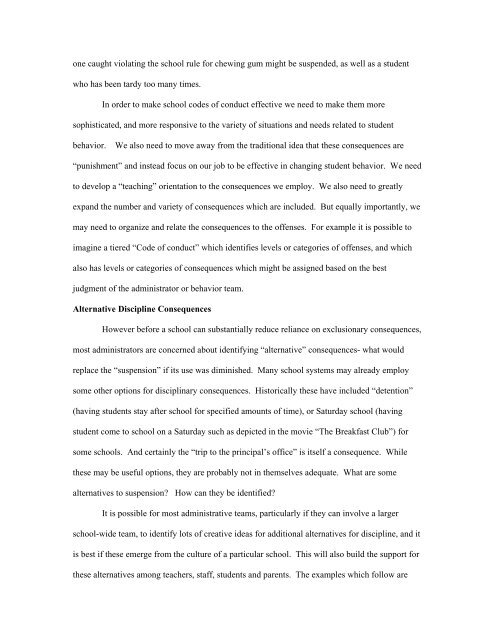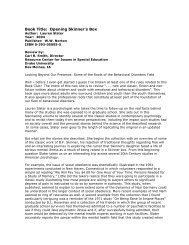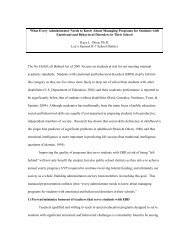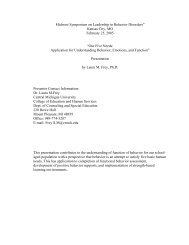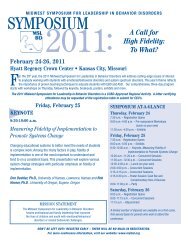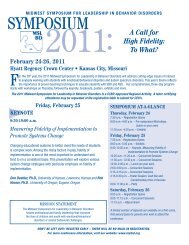Alternatives to Suspension and Expulsion
Alternatives to Suspension and Expulsion
Alternatives to Suspension and Expulsion
Create successful ePaper yourself
Turn your PDF publications into a flip-book with our unique Google optimized e-Paper software.
one caught violating the school rule for chewing gum might be suspended, as well as a student<br />
who has been tardy <strong>to</strong>o many times.<br />
In order <strong>to</strong> make school codes of conduct effective we need <strong>to</strong> make them more<br />
sophisticated, <strong>and</strong> more responsive <strong>to</strong> the variety of situations <strong>and</strong> needs related <strong>to</strong> student<br />
behavior. We also need <strong>to</strong> move away from the traditional idea that these consequences are<br />
“punishment” <strong>and</strong> instead focus on our job <strong>to</strong> be effective in changing student behavior. We need<br />
<strong>to</strong> develop a “teaching” orientation <strong>to</strong> the consequences we employ. We also need <strong>to</strong> greatly<br />
exp<strong>and</strong> the number <strong>and</strong> variety of consequences which are included. But equally importantly, we<br />
may need <strong>to</strong> organize <strong>and</strong> relate the consequences <strong>to</strong> the offenses. For example it is possible <strong>to</strong><br />
imagine a tiered “Code of conduct” which identifies levels or categories of offenses, <strong>and</strong> which<br />
also has levels or categories of consequences which might be assigned based on the best<br />
judgment of the administra<strong>to</strong>r or behavior team.<br />
Alternative Discipline Consequences<br />
However before a school can substantially reduce reliance on exclusionary consequences,<br />
most administra<strong>to</strong>rs are concerned about identifying “alternative” consequences- what would<br />
replace the “suspension” if its use was diminished. Many school systems may already employ<br />
some other options for disciplinary consequences. His<strong>to</strong>rically these have included “detention”<br />
(having students stay after school for specified amounts of time), or Saturday school (having<br />
student come <strong>to</strong> school on a Saturday such as depicted in the movie “The Breakfast Club”) for<br />
some schools. And certainly the “trip <strong>to</strong> the principal’s office” is itself a consequence. While<br />
these may be useful options, they are probably not in themselves adequate. What are some<br />
alternatives <strong>to</strong> suspension? How can they be identified?<br />
It is possible for most administrative teams, particularly if they can involve a larger<br />
school-wide team, <strong>to</strong> identify lots of creative ideas for additional alternatives for discipline, <strong>and</strong> it<br />
is best if these emerge from the culture of a particular school. This will also build the support for<br />
these alternatives among teachers, staff, students <strong>and</strong> parents. The examples which follow are


